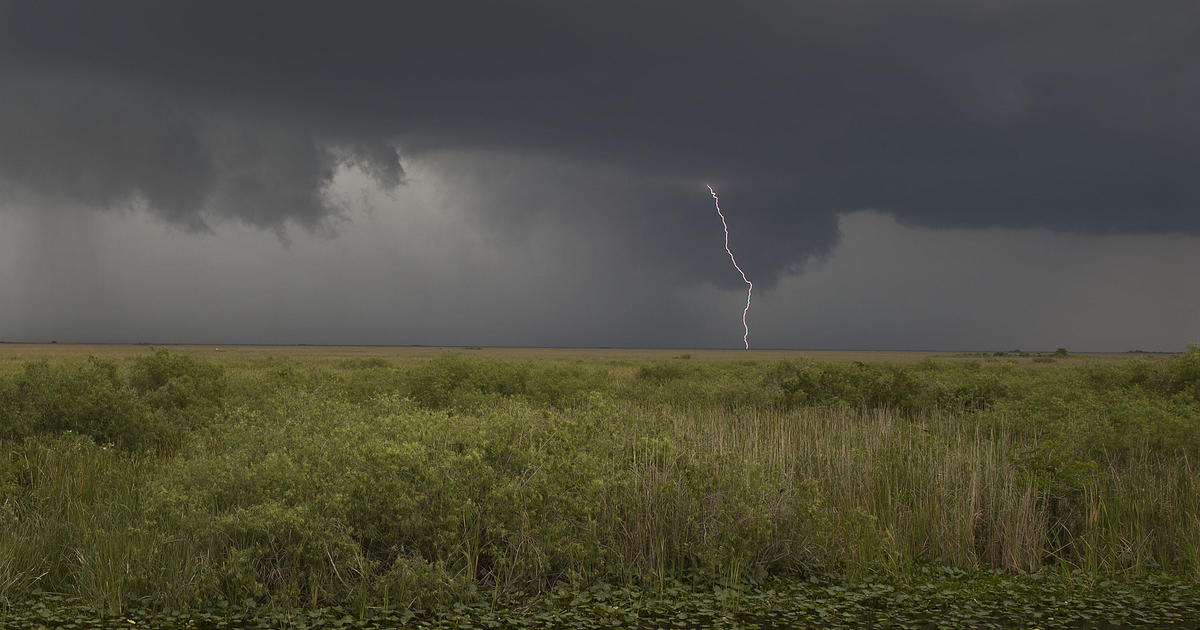Python Challenge Competitors Turn In 68 Snakes
SOUTH FLORIDA (CBSMiami) – Competitors in the 2013 Python Challenge trekked through more than a million acres of swamps and sawgrass in search of the well-camouflaged Burmese python.
The Florida Fish and Wildlife Conservation Commission (FWC) announced the results on Saturday: 68 Burmese pythons harvested during the competition, which was held from Jan. 12 to Feb. 10. The longest measured more than 14 feet long, Florida wildlife officials said Saturday.
That might not seem like a success, considering roughly 1,600 people signed up for the state-sponsored Python Challenge that ended Sunday, but Florida Fish and Wildlife Conservation Commission officials said the hunt may have prevented thousands more pythons from being born in the Everglades.
Female pythons can lay as many as 100 eggs at a time.
"In our view that number — the number that were harvested, taken out of the ecosystem — was an unprecedented number of samples that will help us answer questions about pythons and make us more effective at tackling this problem, removing them from the system. We're going to learn so much," said Nick Wiley, executive director of the wildlife commission.
The highly publicized hunt probably generated more attention-grabbing headlines than snakeskins. Wildlife officials say that was their goal: to raise awareness about the threat pythons and other invasive species pose to native wildlife.
Researchers say pythons are eating their way through the Everglades, decimating populations of native mammals. The snakes can grow more than 20 feet in length, and they have no predators, other than the humans desperately trying to control their population.
Most of the registrants were amateurs lacking the permits usually required to harvest pythons. Two Tennessee men who had been sleeping in their car while hunting had to be rescued by helicopter when they became stranded and disoriented, but most hunters emerged from the Everglades unscathed, if empty-handed.
Ruben Ramirez of Miami and his Florida Python Hunters team won $1,500 for bagging 18 pythons, the most caught by any of the permit holders. He also won prizes for bringing in the two longest snakes to be caught by any of the permit holders. Both those snakes stretched longer than 10 feet.
Brian Barrows of Fort Myers led the competition for amateur hunters, winning $1,500 for harvesting six snakes. His friend, Paul Shannon of Lehigh Acres, won $1,000 for catching a python measuring 14 feet 3 inches long.
The big snake caught Shannon's eye as it slithered through the mud. It didn't like being pulled out and lunged at a friend, Shannon said. Two gunshots to its head finally stopped it.
"When it jumped at him and he dropped it and dove in the bushes, I came around and it was coiled up. The coil was 4 feet wide," he said. "The head was as big as my hand. I have nightmares about that vision of it coiled up, ready to strike again."
The other snakes caught by Barrow and Shannon's team ranged from 7 feet to 9 feet long. On six separate days during the monthlong hunt, they pointed Shannon's airboat toward remote tree islands, looking for snakes sunning themselves on dry land.
"To see one that massive, it was shocking," Barrows said. "You always think these things don't exist out there, and they do. They're out there and they're big."
University of Florida researchers are examining all the harvested snakes, hoping to learn more about the splotchy, tan animal that's hard to see in the Everglades. State wildlife officials will be surveying all the registrants about their methods and the amount of time they spent looking for pythons.
Increasing the number of human python hunters may not be Florida's only option in the ongoing effort to control the snake population. Researchers at Auburn University have been exploring the use of dogs to sniff out pythons.
In a controlled experiment that sent humans and dogs in search of pythons outfitted with radio transmitters, Labrador retrievers previously trained to sniff for bombs did a better job of finding all the snakes, even the smallest ones that were just a foot long, said Christina Romagosa of Auburn's School of Forestry and Wildlife Sciences.
Florida prohibits possession or sale of Burmese pythons for use as pets, and federal law bans the importation and interstate sale of this species. The public can help the fight to control invasive species such as Burmese pythons by:
- Reporting sightings of exotic species to 888-IVE-GOT-1 or www.ivegot1.org. It's helpful if you can submit a photo and location.
- Not releasing an exotic pet into the wild, and reminding others of the dangers of releasing nonnative species.
Go to PythonChallenge.org for additional information.



